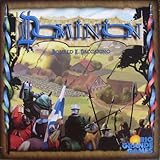Abandoned Mine
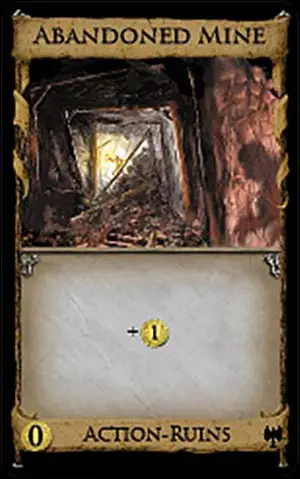
When you play this, you just get + . This is a Ruins; see Additional Rules for Dark Ages and Setup.
. This is a Ruins; see Additional Rules for Dark Ages and Setup.
Altar

You trash a card from your hand if you can, and then gain a card whether or not you trashed one. The gained card comes from the Supply and is put into your discard pile.
Armory
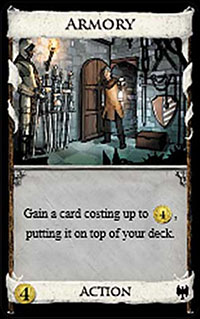
The card you gain comes from the Supply and is put on top of your deck.
Band of Misfits
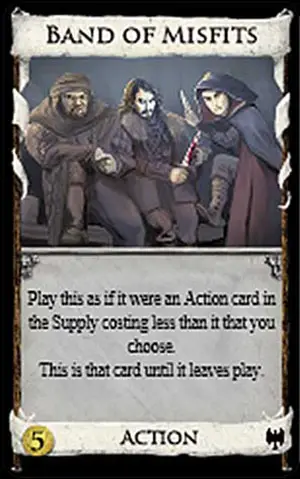
When you play this, you pick an Action card from the Supply that costs less than it, and treat this card as if it were the card you chose. Normally this will just mean that you follow the instructions on the card you picked.
So, if you play Band of Misfits and Fortress is in the Supply, you could pick that and then you would draw a card and get +2 Actions, since that is what Fortress does when you play it. Band of Misfits also gets the chosen card's cost, name, and types.
If you use Band of Misfits as a card that trashes itself, such as Death Cart, you will trash the Band of Misfits (at which point it will just be a Band of Misfits card in the trash). If you use Band of Misfits as a duration card (from Seaside), Band of Misfits will stay in play until next turn, just like the duration card would.
If you use Band of Misfits as a Throne Room (from Dominion), King's Court (from Prosperity), or Procession, and use that effect to play a duration card, Band of Misfits will similarly stay in play. If you use Throne Room, King's Court, or Procession to play a Band of Misfits card multiple times, you only pick what to play it as the first time; the other times it is still copying the same card.
For example, if you use Procession to play Band of Misfits twice and choose Fortress the first time, you will automatically replay it as Fortress, then trash the Band of Misfits, return it to your hand (it is a Fortress when it's trashed, and Fortress has a when-trashed ability that returns it to your hand), and gain an Action card costing exactly  (
( more than Band of Misfits, which has left play and so is no longer copying Fortress). If you use Band of Misfits as a card that does something during Clean-up, such as Hermit, it will do that thing during Clean-up.
more than Band of Misfits, which has left play and so is no longer copying Fortress). If you use Band of Misfits as a card that does something during Clean-up, such as Hermit, it will do that thing during Clean-up.
When you play Horn of Plenty (from Cornucopia), it counts Band of Misfits as whatever Band of Misfits was played as; for example if you play a Band of Misfits as a Fortress, and then play another Band of Misfits as a Scavenger, and then play Horn of Plenty, you will gain a card costing up to  .
.
Band of Misfits can only be played as a card that is visible in the Supply; it cannot be played as a card after its pile runs out, and cannot be played as a non-Supply card like Mercenary; it can be played as the top card of the Ruins pile, but no other Ruins, and can only be played as Sir Martin when that is the top card of the Knights pile.
Bandit Camp
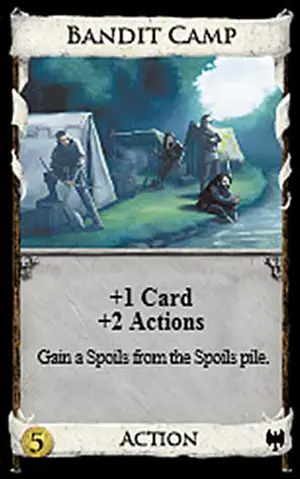
Draw a card before gaining a Spoils. The Spoils comes from the Spoils pile, which is not part of the Supply, and is put into your discard pile. If there are no Spoils cards left, you do not get one.
Beggar

When you play this, you gain three Coppers from the Supply, putting them into your hand. If there are not three Coppers left, just gain as many as you can. When another player plays an Attack card, you may discard this from your hand. If you do, you gain two Silvers from the Supply, putting one on your deck and the other into your discard pile. If there is only one Silver left, put it on your deck; if there are no Silvers left, you do not gain any.
Catacombs
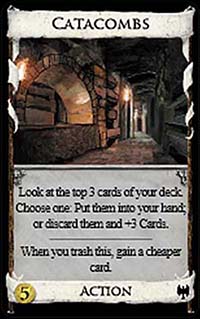
When you play this, you look at the top 3 cards of your deck, and either put all 3 into your hand, or discard all 3 and draw the next 3 cards. If you discard them and have to shuffle to draw 3 cards, you will shuffle in the cards you discarded and may end up drawing some of them.
When you trash Catacombs, you gain a card costing less than it. This happens whether Catacombs is trashed on your turn or someone else's, and no matter who has the card that trashed it. The gained card comes from the Supply and is put into your discard pile.
Count

This card gives you two separate choices: first you either discard 2 cards, put a card from your hand on top of your deck, or gain a Copper; after resolving that, you either get + , trash your hand, or gain a Duchy. For example, you might choose to discard 2 cards, then gain a Duchy. Gained cards come from the Supply and are put into your discard pile. You can choose an option even if you cannot do it. If you trash multiple cards that do something when trashed at once, trash them all, then choose an order to resolve the things that happen due to them being trashed.
, trash your hand, or gain a Duchy. For example, you might choose to discard 2 cards, then gain a Duchy. Gained cards come from the Supply and are put into your discard pile. You can choose an option even if you cannot do it. If you trash multiple cards that do something when trashed at once, trash them all, then choose an order to resolve the things that happen due to them being trashed.
Counterfeit
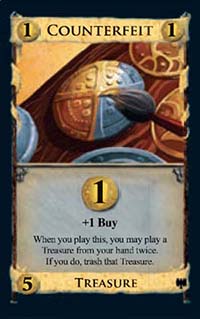
This is a Treasure worth  . You play it in your Buy phase, like other Treasures. When you play it, you also get +1 Buy, and you may play an additional Treasure card from your hand twice.
. You play it in your Buy phase, like other Treasures. When you play it, you also get +1 Buy, and you may play an additional Treasure card from your hand twice.
If you choose to do that, you trash that Treasure. You still get any coins that Treasure gave you from playing it, despite trashing it. If you use Counterfeit to play Spoils twice, you will get + , (in addition to the
, (in addition to the  , from Counterfeit) and return Spoils to the Spoils pile; you will be unable to trash it.
, from Counterfeit) and return Spoils to the Spoils pile; you will be unable to trash it.
If you use Counterfeit to play a Treasure that does something special when you play it, you will do that thing twice. Cards with two types, one of which is Treasure (such as Harem from Intrigue) are Treasures and so can be played via Counterfeit.
Cultist
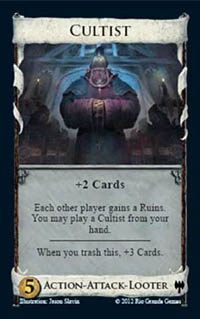
When you play this, you draw two cards, then each other player gains a Ruins. These come from the Ruins pile in the Supply, and are put into discard piles.
Go in turn order starting to your left; each player takes the top Ruins, revealing the next one each time. If the Ruins pile runs out, players stop gaining them at that point. After giving out Ruins, you may play another Cultist from your hand.
It can be one you just drew from playing Cultist, or one you already had in your hand. Playing a Cultist this way does not use up any extra Actions you were allowed to play due to cards like Fortress - the original Cultist uses up one Action and that is it.
When you trash a Cultist of yours, you draw three cards. This happens whether or not it is your turn, and whether or not the card that causes Cultist to be trashed was yours. If you trash a Cultist while revealing cards, such as to a Knight attack, you do not draw the revealed cards that are about to be discarded.
Death Cart
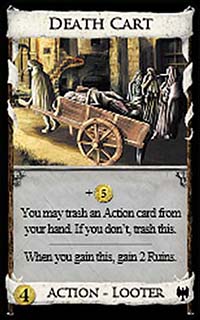
When you play Death Cart, you get +  , and either trash an Action card from your hand, or trash the Death Cart. If you have no Action card in your hand, you will have to trash the Death Cart, but you can trash the Death Cart whether or not you have an Action card in hand. A card with multiple types, one of which is Action, is an Action card.
, and either trash an Action card from your hand, or trash the Death Cart. If you have no Action card in your hand, you will have to trash the Death Cart, but you can trash the Death Cart whether or not you have an Action card in hand. A card with multiple types, one of which is Action, is an Action card.
When you gain a Death Cart, either from buying it or from gaining it some other way, you also gain 2 Ruins. You just take the top 2, whatever they are. If there are not enough Ruins left, take as many as you can.
The Ruins come from the Supply and are put into your discard pile. The other players get to see which ones you got. The player gaining Death Cart is the one who gains Ruins; if Possession (from Alchemy) is used to make another player buy Death Cart, the player actually gaining the Death Cart (the one who played Possession) gains the Ruins.
If you use Trader (from Hinterlands) to take a Silver instead of a Death Cart, you do not gain any Ruins. It doesn't matter whose turn it is; if you use Ambassador (from Seaside) to give Death Carts to each other player, those players also gain Ruins. Passing cards with Masquerade (from Intrigue) does not count as gaining them.
Feodum
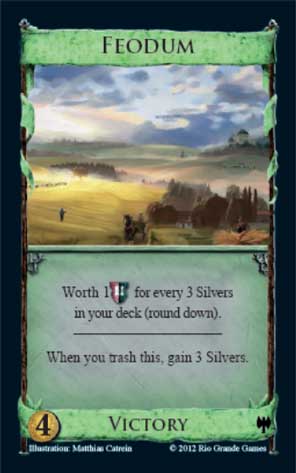
This is a Victory card. Play with 8 for games with 2 players, or 12 cards for games with 3 or more players. At the end of the game, each Feodum is worth 1  for every 3 Silvers in your deck, rounded down. For example, if you have 11 Silvers, your Feodums are worth 3
for every 3 Silvers in your deck, rounded down. For example, if you have 11 Silvers, your Feodums are worth 3  each. If a Feodum is trashed, you gain 3 Silvers. The Silvers come from the Supply and are put into your discard pile. If there are not enough Silvers left, gain as many as you can.
each. If a Feodum is trashed, you gain 3 Silvers. The Silvers come from the Supply and are put into your discard pile. If there are not enough Silvers left, gain as many as you can.
Forager
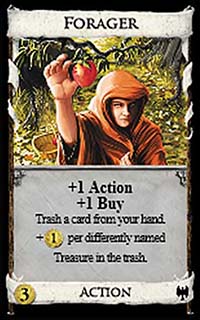
Trash a card from your hand if you can. Whether or not you can, you still get + per differently named Treasure in the trash, plus +1 Action and +1 Buy.
per differently named Treasure in the trash, plus +1 Action and +1 Buy.
Multiple copies of the same Treasure card do not increase how much you get. For example, if the trash has four Coppers, a Counterfeit, and six Estates, you get + . Cards with multiple types, one of which is Treasure (such as Harem from Intrigue), are Treasures.
. Cards with multiple types, one of which is Treasure (such as Harem from Intrigue), are Treasures.
Fortress
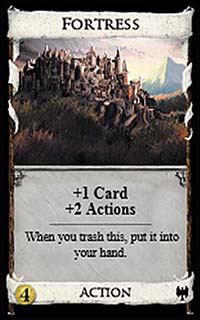
When you play this, you draw a card and get +2 Actions. If this is trashed, you take it from the trash and put it into your hand. This happens no matter whose turn it is when Fortress is trashed. It is not optional.
You still trashed Fortress, even though you get it back; for example if you play Death Cart and choose to trash Fortress, the "if you do" on Death Cart is true, you did trash an Action, so you do not trash Death Cart.
Graverobber
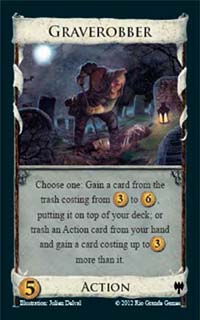
You choose either option, then do as much of it as you can; you can choose an option even if you will not be able to do it. You can look through the trash at any time. If you choose to gain a card from the trash, the other players get to see what it is, and it goes on top of your deck. If there were no cards in your deck, it becomes the only card in your deck.
If there is no card in the trash costing from  to
to  , you will fail to gain one. Cards with
, you will fail to gain one. Cards with  in the cost (from Alchemy) do not cost from
in the cost (from Alchemy) do not cost from  to
to  . If you choose to trash an Action card from your hand, the card you gain comes from the Supply and is put into your discard pile.
. If you choose to trash an Action card from your hand, the card you gain comes from the Supply and is put into your discard pile.
Hermit
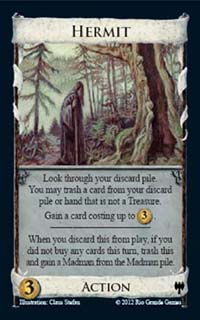
When you play this, look through your discard pile, and then you may choose to trash a card that is not a Treasure, from either your hand or your discard pile. You do not have to trash a card and cannot trash Treasures.
A card with multiple types, one of which is Treasure (such as Harem from Intrigue), is a Treasure. After trashing or not, you gain a card costing up to  . The card you gain comes from the Supply and is put into your discard pile. Gaining a card is mandatory if it is possible. Then, when you discard Hermit from play - normally, in Clean-up, after playing it in your Action phase - if you did not buy any cards this turn, you trash Hermit and gain a Madman.
. The card you gain comes from the Supply and is put into your discard pile. Gaining a card is mandatory if it is possible. Then, when you discard Hermit from play - normally, in Clean-up, after playing it in your Action phase - if you did not buy any cards this turn, you trash Hermit and gain a Madman.
The Madman comes from the Madman pile, which is not in the Supply, and is put into your discard pile. It does not matter whether or not you gained cards other ways, only whether or not you bought a card. If there are no Madman cards left, you do not gain one. If Hermit is not discarded from play during Clean-up - for example, if you put it on your deck with Scheme (from Hinterlands) - then the ability that trashes it will not trigger.
Hovel
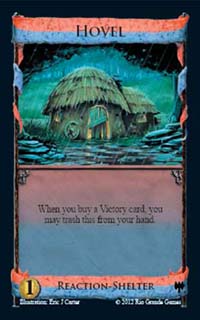
This is a Shelter; see Setup. It is never in the Supply. When you buy a Victory card, if Hovel is in your hand, you may trash the Hovel. A card with multiple types, one of which is Victory, is a Victory card. You do not get anything for trashing Hovel; you just get to get rid of it.
Hunting Grounds
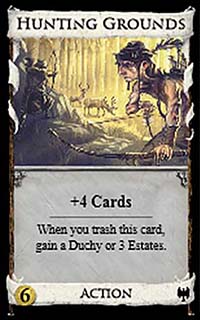
When you play this, draw 4 cards. If this is trashed, you either gain a Duchy or 3 Estates, your choice. These cards come from the Supply and are put into your discard pile. If you choose the 3 Estates and there are not 3 left, just gain as many as you can.
Ironmonger
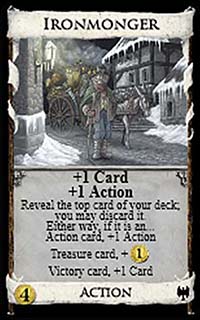
First you draw a card, then you reveal the top card of your deck, then you either discard that card or put it back on top of your deck. Then you get bonuses based on the types of the card you revealed. A card with 2 types gives you both bonuses; for example, if you revealed Harem (from Intrigue), you would both draw a card and get +  .
.
Junk Dealer
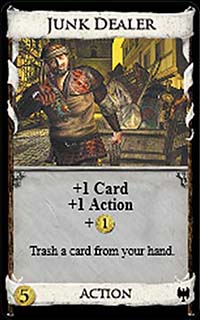
You have to trash a card from your hand if you can. You draw before trashing.
Knights

This is a pile in which each card is different. There is the same basic ability on each card, but also another ability unique to that card in the pile, and they all have different names. Shuffle the Knights pile before playing with it, keeping it face down except for the top one, which is the only card that can be gained from the pile.
See Additional Rules for Dark Ages and Preparation. Follow the rules on Knights in order from top to bottom; Sir Michael causes players to discard before it trashes cards. The ability they have in ommon is that each other player reveals the top 2 cards of his deck, trashes one of them that he chooses that costs from  to
to  , and discards the rest; then, if a Knight was trashed, you trash the Knight you played that caused this trashing.
, and discards the rest; then, if a Knight was trashed, you trash the Knight you played that caused this trashing.
Resolve this ability in turn order, starting with the player to your left. Cards with  in the cost (from Alchemy) do not cost
in the cost (from Alchemy) do not cost  from to
from to  . The player losing a card only gets a choice if both cards revealed cost from
. The player losing a card only gets a choice if both cards revealed cost from  to
to  ; if they both do and one is a Knight but the player picks the other card, that will not cause the played Knight to be trashed.
; if they both do and one is a Knight but the player picks the other card, that will not cause the played Knight to be trashed.
When Sir Martin is the top card of the pile, it can be gained with an Armory and so on. If Sir Vander is trashed, you gain a Gold; this happens whether it is trashed on your turn or someone else's. The player who had Sir Vander is the one who gains the Gold, regardless of who played the card that trashed it. The Gold from Sir Vander, and the card gained for Dame Natalie, comes from the Supply and is put into your discard pile.
When playing Dame Anna, you may choose to trash zero, one, or two cards from your hand. Dame Josephine is also a Victory card, worth 2  at the end of the game. The Knight pile is not a Victory pile though, and does not get a counter for Trade Route (from Prosperity) even if Dame Josephine starts on top. If you choose to use the Knights with Black Market (a promotional card), put a Knight directly into the Black Market deck, rather than using the randomizer card. Sir Martin only costs
at the end of the game. The Knight pile is not a Victory pile though, and does not get a counter for Trade Route (from Prosperity) even if Dame Josephine starts on top. If you choose to use the Knights with Black Market (a promotional card), put a Knight directly into the Black Market deck, rather than using the randomizer card. Sir Martin only costs  , though the other Knights all cost
, though the other Knights all cost  .
.
Madman
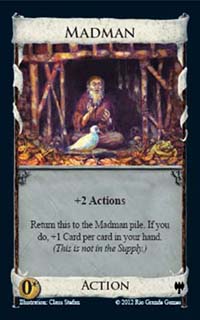
This card is not in the Supply; it can only be obtained via Hermit. When you play it, you get +2 Actions, return it to the Madman pile if you can (this is not optional), and if you did return it, you draw a card per card in your hand. For example if you had three cards in hand after playing Madman, you would draw three cards.
Normally, nothing will prevent you from returning Madman to the Madman pile, but you may fail to due to playing Madman twice via Procession, Throne Room (from Dominion), or King's Court (from Prosperity). So, for example, if you Procession a Madman, you will get +2 Actions, return Madman to the Madman pile, draw a card per card in your hand, get another +2 Actions, fail to return Madman and so not draw cards the second time, fail to trash Madman, and then gain an Action card costing exactly  if you can.
if you can.
Marauder
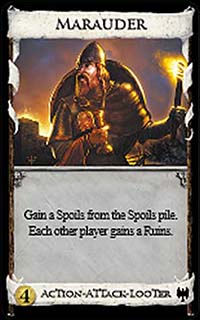
First you gain a Spoils. It comes from the Spoils pile, which is not part of the Supply, and is put into your discard pile. If there are no Spoils cards left, you do not get one. Then each other player gains a Ruins. These come from the Ruins pile in the Supply, and are put into discard piles. Go in turn order starting to your left; each player takes the top Ruins, revealing the next one each time. If the Ruins pile runs out, players stop gaining them at that point.
Market Square
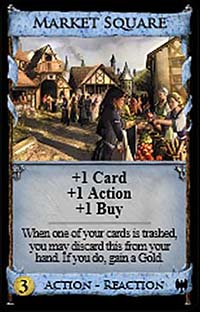
When you play this, you draw a card and get +1 Action and +1 Buy. When one of your cards is trashed, you may discard Market Square from your hand. If you do, you gain a Gold.
The Gold comes from the Supply and is put into your discard pile. If there is no Gold left in the Supply, you do not gain one. You may discard multiple Market Squares when a single card of yours is trashed.
Mercenary
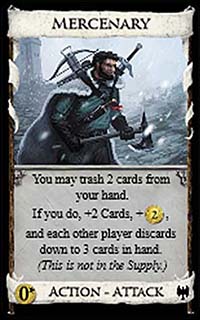
This card is not in the Supply; it can only be obtained via Urchin. When you play it, you may trash 2 cards from your hand. If you do, you draw two cards, get +  , and each other player discards down to 3 cards in hand. Players who already have 3 or fewer cards in hand do nothing.
, and each other player discards down to 3 cards in hand. Players who already have 3 or fewer cards in hand do nothing.
Players responding to this Attack with cards like Beggar must choose to do so before you decide whether or not to trash 2 cards from your hand. If you play this with only one card in hand, you may choose to trash that card, but then will fail the "if you do" and will not draw cards and so on. If the cards you trash do things when trashed, first trash them both, then choose what order to resolve the things they do when trashed.
Mystic

You get +1 Action and +  . Then name a card ("Copper", for example - not "Treasure") and reveal the top card of your deck; if you named the same card you revealed, put the revealed card into your hand. If you do not name the right card, put the revealed card back on top. You do not need to name a card being used this game. Names need to match exactly for you to get the card; for example Sir Destry and Sir Martin do not match. You do not need to name a card available in the Supply.
. Then name a card ("Copper", for example - not "Treasure") and reveal the top card of your deck; if you named the same card you revealed, put the revealed card into your hand. If you do not name the right card, put the revealed card back on top. You do not need to name a card being used this game. Names need to match exactly for you to get the card; for example Sir Destry and Sir Martin do not match. You do not need to name a card available in the Supply.
Necropolis
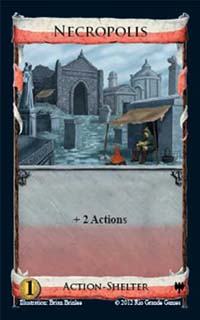
This is a Shelter; It is never in the Supply. It is an Action card; when you play it, you get +2 Actions.
Overgrown Estate
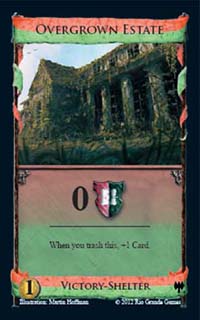
This is a Shelter; It is never in the Supply. It is a Victory card despite being worth 0  . If this is trashed, you draw a card, right then, even in the middle of resolving another card. For example, if you use Altar to trash Overgrown Estate, you first draw a card, then gain a card costing up to
. If this is trashed, you draw a card, right then, even in the middle of resolving another card. For example, if you use Altar to trash Overgrown Estate, you first draw a card, then gain a card costing up to  . This card does not give you a way to trash itself, it merely does something if you manage to trash it.
. This card does not give you a way to trash itself, it merely does something if you manage to trash it.
Pillage
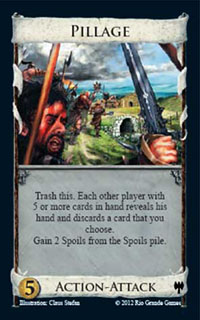
First trash Pillage. Then each other player with 5 or more cards in hand reveals his hand and discards a card of your choice. This happens in turn order, starting with the player to your left. Then you gain two Spoils cards. The two Spoils cards come from the Spoils pile, which is not part of the Supply, and are put into your discard pile. If there are no Spoils cards left, you do not get one; if there is only one, you just get one.
Poor House
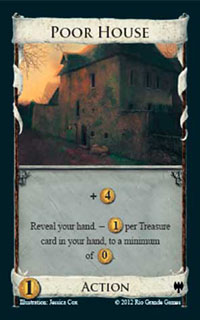
First you get +  . Then you reveal your hand, and lose
. Then you reveal your hand, and lose  per Treasure card in it. You can lose more than
per Treasure card in it. You can lose more than  this way, but the amount of coins you have available to spend can never go below
this way, but the amount of coins you have available to spend can never go below  . Cards with two types, one of which is Treasure (such as Harem from Intrigue) are Treasure cards.
. Cards with two types, one of which is Treasure (such as Harem from Intrigue) are Treasure cards.
Procession
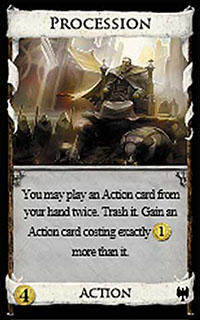
Playing an Action card from your hand is optional. If you do play one, you then play it a second time, then trash it, then gain an Action card costing exactly  more than it (even if somehow you failed to trash it).
more than it (even if somehow you failed to trash it).
Gaining a card is not optional once you choose to play an Action card, but will fail to happen if no card in the Supply costs the exact amount needed. If something happens due to trashing the card - for example drawing 3 cards due to trashing a Cultist - that will resolve before you gain a card.
The gained card comes from the Supply and is put into your discard pile. This does not use up any extra Actions you were allowed to play due to cards like Fortress - Procession itself uses up one Action and that is it. You cannot play any other cards in between resolving the Procession-ed Action card multiple times, unless that Action card specifically tells you to (such as Procession itself does).
If you Procession a Procession, you will play one Action twice, trash it, gain an Action card costing  more, then play another Action twice, trash it, gain an Action card costing
more, then play another Action twice, trash it, gain an Action card costing  more, then trash the Procession and gain an Action costing
more, then trash the Procession and gain an Action costing  more than it.
more than it.
If you Procession a card that gives you +1 Action, such as Vagrant, you will end up with 2 Actions to use afterwards, rather than the one you would have left if you just played two Vagrants. If you use Procession on a Duration card (from Seaside), Procession will stay out until your next turn and the Duration card will have its effect twice on your next turn, even though the Duration card is trashed.
Rats

Follow the instructions in order. First draw a card; then gain a Rats from the Supply, putting it into your discard pile; then trash a card from your hand that is not a Rats card. If there are no Rats cards left, you do not gain one.
If you have no cards in your hand other than Rats, reveal your hand and you do not trash a card. If Rats is trashed, you draw a card. This happens whether it is your turn or another player's, and regardless of which player has the card that trashed Rats. There are 20 copies of Rats, rather than the usual 10; the pile starts with all 20, regardless of the number of players.
Rebuild
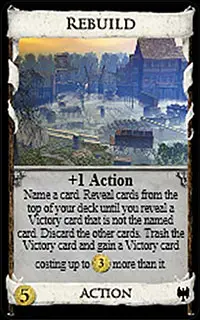
You can name any card, whether or not it is being used this game or is a Victory card. Then reveal cards from your deck until you reveal a Victory card that is not what you named. If you run out of cards, shuffle your discard pile and continue, without shuffling in the revealed cards. If you run out of cards with no cards left in your discard pile, stop there, discard everything, and nothing more happens.
If you did find a Victory card that was not what you named, you discard the other revealed cards, trash the Victory card, and gain a Victory card costing up to  more than the trashed card. The card you gain comes from the Supply and is put into your discard pile.
more than the trashed card. The card you gain comes from the Supply and is put into your discard pile.
Rogue

If there is a card in the trash costing from  to
to  , you have to gain one of them; it is not optional. You can look through the trash at any time. The other players get to see what card you took. The gained card goes into your discard pile. Cards with
, you have to gain one of them; it is not optional. You can look through the trash at any time. The other players get to see what card you took. The gained card goes into your discard pile. Cards with  in the cost (from Alchemy) do not cost from
in the cost (from Alchemy) do not cost from  to
to  .
.
If there was no card in the trash costing from  to
to  , you instead have each other player reveal the top 2 cards of his deck, trash one of them of his choice that costs from
, you instead have each other player reveal the top 2 cards of his deck, trash one of them of his choice that costs from  to
to  (if possible), and discard the rest. Go in turn order, starting with the player to your left.
(if possible), and discard the rest. Go in turn order, starting with the player to your left.
Ruined Library
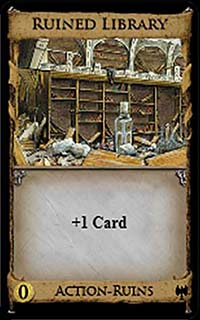
When you play this, you draw a card. This is a Ruins;
Ruined Market
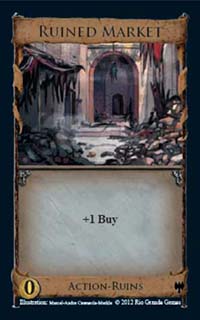
When you play this, you just get +1 Buy. This is a Ruins;
Ruined Village
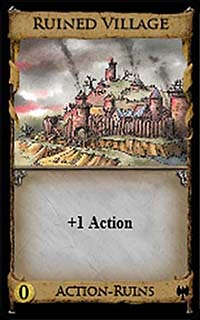
When you play this, you just get +1 Action. This is a Ruins;
Sage

If you run out of cards while revealing cards, shuffle your discard pile (not including the revealed cards) and continue. If you run out of cards to reveal and have no cards in your discard pile, stop there; discard everything revealed, and you do not get a card.
If you find a card costing  or more, put that one into your hand and discard the rest. For example you might reveal Copper, then Copper, then Curse, then Province; Province costs
or more, put that one into your hand and discard the rest. For example you might reveal Copper, then Copper, then Curse, then Province; Province costs  , so you would stop there, put Province in your hand, and discard the two Coppers and the Curse.
, so you would stop there, put Province in your hand, and discard the two Coppers and the Curse.
Scavenger
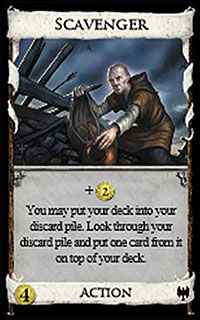
Putting your deck into your discard pile is optional, but putting a card from your discard pile on top of your deck is not; you do it unless there are no cards in your discard pile. Putting your deck into your discard pile will not trigger Tunnel (from Hinterlands). If your deck has no cards in it, such as from putting them into your discard pile, then the card you put on top of your deck will be the only card in your deck.
Spoils
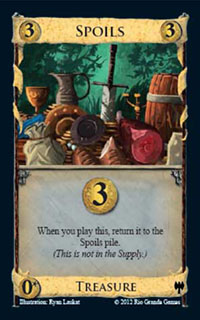
This is never in the Supply; it can only be obtained via Bandit Camp, Marauder, and Pillage. When you play Spoils, you get + to spend this turn, and return that copy of Spoils to its pile. You are not forced to play Treasures in your hand.
to spend this turn, and return that copy of Spoils to its pile. You are not forced to play Treasures in your hand.
Squire
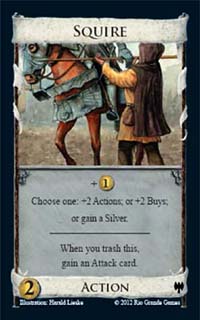
When you play this, you get + , and your choice of either +2 Actions, +2 Buys, or gaining a Silver. The Silver comes from the Supply and is put into your discard pile. If Squire is trashed somehow, you gain an Attack card; the Attack card comes from the Supply and is put into your discard pile. You can gain any Attack card available in the Supply, but if no Attack card is available, you do not gain one.
, and your choice of either +2 Actions, +2 Buys, or gaining a Silver. The Silver comes from the Supply and is put into your discard pile. If Squire is trashed somehow, you gain an Attack card; the Attack card comes from the Supply and is put into your discard pile. You can gain any Attack card available in the Supply, but if no Attack card is available, you do not gain one.
Storeroom
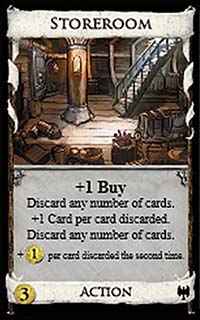
Discard any number of cards from your hand, and draw as many cards as you discarded. Then, discard any number of cards - which could include cards you just drew - and you get + per card you discarded that time.
per card you discarded that time.
Survivors

You either discard both cards, or put both cards back on top; you cannot just discard one card. This is a Ruins; see Additional Rules for Dark Ages and Setup.
Urchin
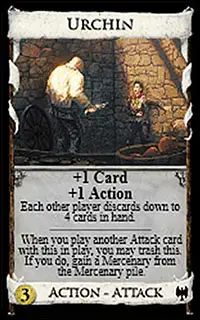
When you play this, you draw a card and get +1 Action, then each other player discards down to 4 cards in hand. Players who already have 4 or fewer cards in hand do not do anything.
While Urchin is in play, when you play another Attack card, before resolving it, you may trash the Urchin. If you do, you gain a Mercenary. The Mercenary comes from the Mercenary pile, which is not in the Supply, and is put into your discard pile.
If there are no Mercenaries left you do not gain one. If you play the same Urchin twice in one turn, such as via Procession, that does not let you trash it for a Mercenary. If you play two different Urchins however, playing the second one will let you trash the first one.
Vagrant
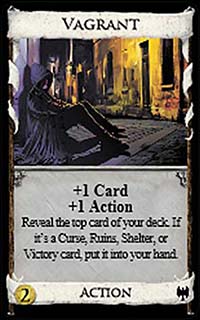
You draw a card before revealing your top card. If the top card of your deck is a Curse, Ruins, Shelter, or Victory card, it goes into your hand; otherwise it goes back on top. A card with multiple types goes into your hand if at least one of the types is Curse, Ruins, Shelter, or Victory.
Wandering Minstrel
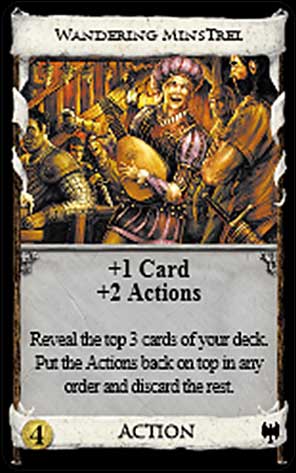
First draw a card, then reveal the top 3 cards of your deck, shuffling your discard pile if there are not enough cards in your deck. If there still are not enough after shuffling, just reveal what you can. Put the revealed Action cards on top of your deck in any order, and discard the other cards. A card with multiple types, one of which is Action, is an Action card. If you didn't reveal any Action cards, no cards will be put on top.
Continue Reading
